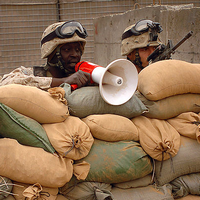When President Barack Obama first announced his plan in early 2009 for withdrawal from Iraq, it initiated a debate within U.S. national security circles: Would Shiite insurgents operating in the country stage a final attack on U.S. troops as they withdrew? Initially it was believed that such an attack would happen in the summer of 2009, as Coalition Forces consolidated to bases removed from local population centers, as per Obama's plan. But 2009 passed without incident, leaving analysts slightly reassured about the impact of relentless Coalition Force operations targeting three key Shiite insurgent groups -- Kata'ib Hezbollah, Jaysh al-Mahdi, and Asa'ib Ahl al-Haqq.
Although no attack took place, the concerns of U.S. policymakers and counterinsurgency analysts were not unfounded. They needed to look no further than Lebanon to find historical examples of Shiite-led offensives aimed at claiming responsibility for pushing out a foreign occupier. In 1983, the U.S. Marine barracks bombing led President Ronald Reagan to "redeploy" U.S. troops. In 2000, Hezbollah mounted a sustained offensive against the Israeli Defense Forces as they withdrew from their position south of the Litani River and out of the country.
Strategically, it matters little whether or not the occupier is already planning on leaving -- as is now the case for the U.S. in Iraq, and was arguably true of the Israelis in Lebanon in 2000. What matters is how the event is perceived on the Shiite street: If such an offensive succeeds in maximizing media coverage at an appropriate moment, and elicits a sloppy U.S. response, the group responsible could leverage what would likely be overwhelming support on the Shiite street to catapult itself to the forefront of popular Iraqi politics as a hybrid militia-political party, much like Hezbollah did in Lebanon.

